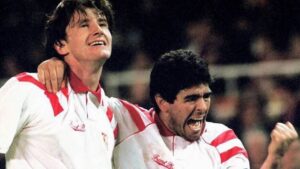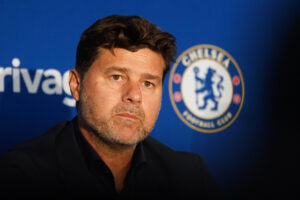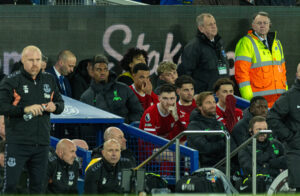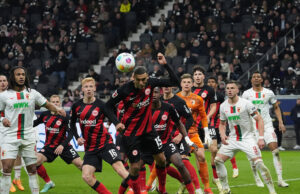On 18th November, the Premier League reached a landmark moment. It had nothing to do with incoming players and managers, or a sudden transformation in the league’s prospects. Those have already come.
Instead, this news came from across the Atlantic. The finalists in the broadcasting showdown to win the Premier League’s TV rights were NBC and ESPN.
Originally it was thought the price to show all 380 league matches would land around the $1.1 billion mark. This was identical to the previous six-year deal with NBC. However, the bidding war intensified. The value was upped and upped with neither side willing to accept defeat. Eventually, NBC regained their crown by astonishingly paying more than £2 billion ($2.7 billion) for six years.
This blew the previous US TV deals out of the water. Before 2013, ESPN and Fox paid a combined total of £60 million for three years. Between 2013 and 2016, NBC paid £180 million. After this, NBC handed over £800 million for six years.
Whilst the Premier League completed their victory lap, and the clubs sung praises to chief executive Richard Masters, the importance of this deal cannot be overstated. It will have a significant impact on the league, English football, America and the future of European football.
Consequences of the Premier League’s Blockbuster US TV Deal
Masters Win
First things first, this is a major win for Richard Masters at a time where he desperately needed one. Since being appointed chief executive in December 2019, he has had to manage Covid-19, Project Big Picture, the breakaway Super League and the Saudi-led takeover of Newcastle United, as well as the moral and ambiguous details around the agreement. The latter incident caused a rebellion against Premier League chairman Gary Hoffman, which has now led to his resignation.
But his departure has been inevitable for a while. One problem was he knew little about what was happening in his own house. He was far from involved in Project Big Picture and the Super League and knew little of the events when they broke into the public domain. “Think about what he didn’t do rather than what he did wrong,” one Premier League source told The Athletic.
The undermining of Hoffman’s position is a subsequent blow to Master’s authority as the two have to work together closely to ensure the Premier League operates as smooth as possible.
Alex Horne, the former CEO of the English FA, told The Athletic Football Podcast the relationship between the two needs to be “fluid” and ensure there are no “gaps” in responsibility.
“Between them, they have to manage that entire agenda: all the stakeholders, the external people who are interested in the business, whether that is the league, or indeed club, or the national association,” he said.
Horne added: “The strength and balance is in getting the right executive in roles to do the job [and] the right support from the board with the independents being able to balance the views of the stakeholders. But the lynchpin, the critical junction, is between the chairman and chief executive. That is what holds the whole thing together.”
And at times, it has seemed like the leadership was being undermined. Project Big Picture threatened the balance in the English game and the official emergence of the Super League attacked the sport directly. The Newcastle takeover was one step too far for Hoffman, as clubs became tense over why the Premier League suddenly changed their mind.
If the US TV resulted in a mediocre deal, it would have been perfectly within character for the club directors to begin to fire questions towards the Premier League chief executive.
Nonetheless, this win for Masters buys him universal approval from the stakeholders – something that rarely happens.
Soccer Fever
Meanwhile, over in the Atlantic, Master’s triumph will have an impact on how football, or soccer, grows in the United States. Soccer is believed to have overtaken ice hockey in viewership and this deal should see it rise further. Fans will not need to go through the hassle of changing subscriptions and getting used to a new set of analyses’ or type of coverage.
Soon to be nine years of NBC broadcasting has established a new fanbase which has doubled since 2013. American sports fans’ interest has risen from 12 per cent to 15 per cent. Around 10 per cent are also willing to pay to watch Premier League football – double that of two years ago.
A poll published by Global Sports & News Survey 2020 suggests the MLS and Premier League hold similar interest overall, with this rising among 18-24-year-olds. This is slightly behind the interest shown to the US women’s national team. Whilst this survey is from a year ago, it displays the rising soccer fever in the United States.
These numbers have been catapulted by NBC’s immensely popular show, Premier League Mornings Live. It is hosted by Rebecca Lowe and has acted as a platform for American fans to watch and study the game in a new light. They also have the ability to connect to a team they can root for.
Predictably, the likes of Manchester United, Liverpool, Arsenal and Chelsea will draw the largest chunk of news fans. Though, it is not limited to that as Lowe said earlier this month fans are widening their scope to teams like West Ham, Crystal Palace and Norwich City. She says this is down to bonds they might have formed in some manner, ranging from heritage, a place they have visited or where they may have gone to university.
“I think to some degree you do see fans choose a club based on a personal experience and we’re starting to see those fans dig in and the bonds they form with a club become more deep,” Lowe explained.
Nothing has been able to display this type of connection more than the sympathetic and warm-hearted fictional show, Ted Lasso. The show, and the character itself, has broken down barriers that have always remained in the US. Typically, soccer was viewed as a joke, so Lasso superbly plays on that joke.
But, anyone who has seen the programme knows Ted Lasso goes beyond the stereotype. It focuses on people and uses the sport as a vehicle to tell a story that would not be completely alien if it were to happen in real life. At the time of July 24th, season two was the eighth-most in-demand American TV show.
The power of planting soccer seeds through pop culture is significant. It makes the league mainstream and a household discussion topic. Those that would otherwise not be interested in soccer, may suddenly switch on when they see Premier League storylines unfold. Or, on the other side, it sparks a new interest as to why the ever-smiling Dani Rojas believes football is life.
Premier League Hegemony
What the US TV agreement confirms on a grander scale is the Premier League’s hegemony over their peers.
ESPN is paying £120 million to La Liga and £25 million to Bundesliga this season. CBS has a deal with Serie A which is less than £50 million per season, while they pay over £100 million for UEFA’s competitions. Financially, the Premier League were already far ahead of their competitors. Now they have extended that lead.
Of course, it would be easy to revel in how great this makes the Premier League. More money. More cash for players and managers. More quality. More dominance in Europe. More eyes on the TV. More money to be made when the next agreement comes around. The math equation is easy: more is better.
Except, this belief is flawed. Everyone has a right to seek pleasure in watching the magical wonders of Mohammed Salah and co dazzle every week. Though, with the desire for more extending further and further, it accelerates the broken system that has resulted in a fan-led government review and the possible introduction of an independent regulator.
The review’s recommendations should be announced next week.
Whenever the league has an opportunity, they exhale how Premier League hegemony is for the greater good of football. They did not miss this chance once the TV deal was secured.
“These deals will enable the league to invest £1.6 billion of broadcast revenue outside of the League to lower-league and non-league clubs, the grassroots game and communities; continuing the Premier League’s support for all levels of the English game,” the Premier League said.
“It was announced earlier today that an extra £20 million will be paid to EFL League One and League Two clubs this season. A new package of £5 million extra will support clubs in the top-three National League divisions until 2025.”
This act of generosity will hardly silence the critics. EFL chief executive Rick Parry hopes of striking a new financial distribution agreement with the top division has all but evaporated until the government intervenes.
English-less Super League
When the Super League collapsed as quickly as it rose, it was down to the English clubs backing away. Manchester City and Chelsea pressed the retreat button once they realised how unpopular the concept was.
Months later, the Super League is very much alive. The only difference will be how it is repackaged. Behind-the-scenes chatter hints Real Madrid president Florentino Perez and the other supporters could be open to a competition without the English clubs.
On the surface, it would be difficult to imagine how strong such a competition would be. The English clubs are the ones with the most power, particularly on the European stage.
However, it may be the only remaining option. The Premier League is a continuously growing commercial entity. It is hard to believe the six clubs will break away, again, when things are going so well for a previously failed experiment. They are not as desperate as Barcelona, Real Madrid or Juventus
Watching on, the Super League conspirators may now be focusing more of their attention on an English-less Super League. It would not have been a part of the original plan, but perhaps the only one they have left.
Main Photo






